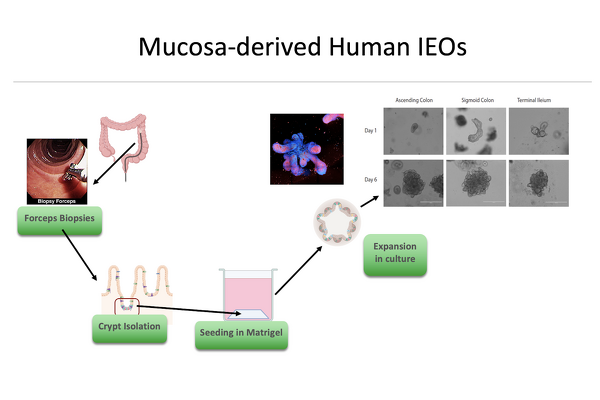At the Centre for Children’s Gut Health, we harness the power of patient-derived intestinal organoids (IEOs) to investigate the cellular and molecular underpinnings of paediatric gastrointestinal disease — with a clear focus on clinical translation.
Derived from minimally invasive endoscopic biopsies, IEOs are three-dimensional, self-renewing cultures that recapitulate key features of the human intestinal epithelium, including gut segment identity, stem cell function, and barrier properties. Unlike traditional 2D cell lines, these models retain epigenetic, transcriptional, and functional signatures of the patient’s original tissue, enabling physiologically relevant research in vitro.
Our group has established one of the world’s largest paediatric IBD organoid biobanks, now serving as a cornerstone of the ORBIT-IBD global research programme. These models enable us to:
In collaboration with Professor Roisin Owens (Department of Chemical Engineering and Biotechnology, University of Cambridge), we are now developing next-generation organoid platforms. These include:
These innovations represent a critical advance in organoid complexity, fidelity, and scalability — directly aligned with our goals to personalise therapy and improve outcomes in children with IBD and related disorders.
IEOs are not merely a model system. They are a translational platform — offering a bridge from bench to bedside, and ultimately, to better care for young patients.
DNA methylation and transcription patterns in intestinal epithelial cells from pediatric patients with inflammatory bowel diseases differentiate disease subtypes and associate …
KJ Howell, J Kraiczy, KM Nayak, M Gasparetto, A Ross, C Lee, TN Mak, ...
Gastroenterology 154 (3), 585-598
Patient-derived organoid biobank identifies epigenetic dysregulation of intestinal epithelial MHC-I as a novel mechanism in severe Crohn’s Disease
TW Dennison, RD Edgar, F Payne, KM Nayak, ADB Ross, A Cenier, ...
Gut 73 (9), 1464-1477
DNA methylation defines regional identity of human intestinal epithelial organoids and undergoes dynamic changes during development
J Kraiczy, KM Nayak, KJ Howell, A Ross, J Forbester, C Salvestrini, ...
Gut 68 (1), 49-61
Biobanking of human gut organoids for translational research
F Perrone, M Zilbauer
Experimental & Molecular Medicine 53 (10), 1451-1458
Culture-associated DNA methylation changes impact on cellular function of human intestinal organoids
RD Edgar, F Perrone, AR Foster, F Payne, S Lewis, KM Nayak, J Kraiczy, ...
Cellular and Molecular Gastroenterology and Hepatology 14 (6), 1295-1310
Intestinal epithelial organoids as tools to study epigenetics in gut health and disease
J Kraiczy, M Zilbauer
Stem cells international 2019 (1), 7242415
Genome-wide epigenetic and transcriptomic characterization of human-induced pluripotent stem cell–derived intestinal epithelial organoids
J Kraiczy, ADB Ross, JL Forbester, G Dougan, L Vallier, M Zilbauer
Cellular and Molecular Gastroenterology and Hepatology 7 (2), 285-288
Single-cell sequencing of developing human gut reveals transcriptional links to childhood Crohn’s disease
R Elmentaite, ADB Ross, K Roberts, KR James, D Ortmann, T Gomes, ...
Developmental cell 55 (6), 771-783. e5
In Vitro Models for Investigating Intestinal Host–Pathogen Interactions
R McCoy, S Oldroyd, W Yang, K Wang, D Hoven, D Bulmer, M Zilbauer, ...
Advanced Science 11 (8), 2306727
